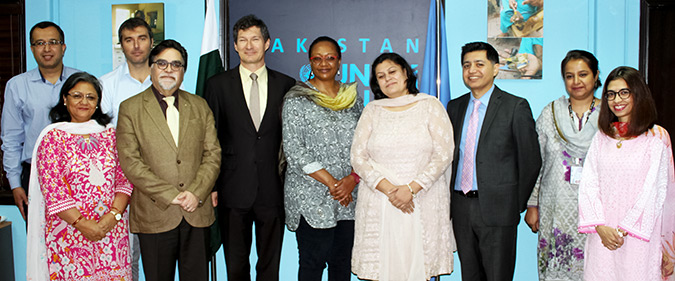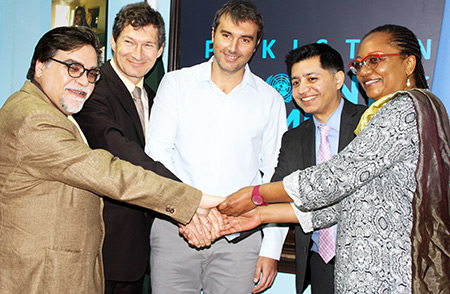UN agencies join hands to expand services for survivors of gender-based violence in Pakistan
Date:
Author: Myra Imran
Islamabad, Pakistan — Women and girls who have experienced gender-based violence will have greater access to essential and quality multi-sectoral services thanks to a new program jointly implemented by four United Nations agencies including UN Women.

Contracts to roll out the United Nations Joint Global Programme on Essential Services for Women and Girls Subject to Violence were signed by the representatives of the respective agencies -- UN Women, UN Office on Drugs and Crimes (UNODC), UN Population Fund (UNFPA) and World Health Organization (WHO). UN Women is the coordinating agency.
The Essential Services package comprises health, justice, policing, and social services, along with coordination and good governance in coordination of these services.
During Phase I of the program, from 2013 to 2016, the agencies developed global guidelines and tools for the multi-sectoral services for survivors. These will now be tested in Pakistan, chosen as a pilot country for the implementation Phase II, from 2017 to 2018.

The United Nations Resident Coordinator, Neil Buhne, said at the ceremony: “Violence against women is not only a travesty of women’s dignity and rights but also a tragic cost to families, communities, and countries. Preventing that violence and providing services to those who are affected, is both a necessity and a modest investment to help women have more opportunities so that no one is left behind.”
UN Women Country Representative, Jamshed Kazi, said the expanded services will help ensure the protection and rehabilitation of survivors and help prevent violence from reoccurring.
“These services, with the support of legal reforms and policies, can result in a transformative change by addressing the root causes of violence, to bring about women empowerment and gender equality in the country,” he said.
WHO’s Country Representative, Dr. Mohammad Assai Ardakani, said the program will help Pakistan achieve the United Nations Sustainable Development Goals for 2030. He said: “The SDGs are centered on the idea of ‘leave no one behind.’ We cannot have women left behind in health, development and well-being because they are experiencing violence, discrimination, poverty and gender inequality.”
The Officer In-Charge at UNODC, Danilo Campisi, said his agency welcomed the opportunity to collaborate with other United Nations agencies to strengthen the rule of law and improve police services for survivors.
The Deputy Representative of UNFPA, Sarah Masale, said that by stemming gender-based violence, the package of services is vital for countries to achieve universal access to sexual and reproductive health and ensure the sexual and reproductive rights of women and youth.
For more information:
Please contact
Faria Salman
Strategic Management and Partnerships Officer & Head of Communications
UN Women Pakistan
Email: [ Click to reveal ]
Aisha Mukhtar
Programme Lead, Eliminating Violence against Women, Governance and Human Rights
UN Women Pakistan
Email: [ Click to reveal ]